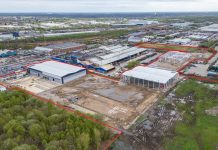M&G Real Estate’s latest office market study concludes that whilst the Continental European office sector has been boosted by yield compression and rental growth, it is edge of central business districts (CBDs) which are providing the most attractive opportunities for investment. A short supply of new office stock and an improving labour market employment have led to rental growth in CBDs, sparking demand for space in peripheral or ‘edge of CBD’ areas.
As prime office yields approach historical lows in Paris and Berlin (3.0%), coupled with the weight of capital searching for income opportunities, investors are being pushed to search further afield to find value. In Munich, 37% of the deals concluded in the first quarter of 2017 were edge of CBDs locations, where rent equates to €246 per sq m per annum compared to €432 per sq m in prime locations.
Infrastructure investment bringing life to peripheral areas
A significant contributor to the transport connectivity of cities is infrastructure investment: another key factor driving the appeal of peripheral locations. Stockholm’s Solna/Sundbyberg districts already have a 0.75% yield premium compared to the CBD, which still stands to benefit from the proposed subway extension from the city centre. Areas on the outskirts of Paris such as Saint Denis are also receiving a boost thanks to the Grand Paris project, a major infrastructure initiative to improve and extend the existing transport network and provide new metro lines.
Technology influencing occupier preferences
The report also highlights that digital connectivity and smart office space are increasingly important factors for occupiers. ‘Technologically smart’ buildings reduce operational costs and improve productivity and wellbeing, whilst open and collaborative workspace is becoming a more popular and cost-effective way to let space. Consequently, the social amenties on offer, digital connectivity and fit out of a building are of the utmost importance to investors – properties which meet these criteria can provide the best potential rental growth prospects and help with occupier attraction and retention.
Elsewhere, Berlin is noted as the fastest growing location for IT-start ups worldwide, radically changing the make up of office tenants and boasting the highest proportion of flexible co-working space. The Technology, Media and Telecommunications (TMT) sector is now the second largest driver of take up in the city, accounting for 38,000 creative and TMT companies operating in the city and a further 14,000 jobs estimated to be added to the sector by 2020. The average annual rent in this submarket has increased by 64% in the last three years, outpacing prime office space’s growth by 48%.
Digital solutions changing the way we impact with the urban landscape
With growing numbers of people opting to live and work in towns and cities, digital solutions are creating investment opportunities in regeneration areas. Helsinki is a prime example of a city which is forecast to produce significant real estate investment opportunities as it invests in technology to make its centre car-free by 2025, helping people to travel easily and affordably using public and private transport.
Brexit impact positive for office markets but not necessarily a game changer
Whilst it is safe to say that the outcome of the UK Referendum has reinforced the appeal of Berlin, Paris, Dublin, Frankfurt and Luxembourg as select companies relocate staff outside the UK, only 75,000 possible jobs are forecast to move to these cities, equating to just 7% of London’s financial sector.
Vanessa Muscarà, Associate Director, Property Research, comments: “We believe there is relatively better value to be found in edge of CBD submarkets, particularly those benefitting from major planned transport infrastructure projects that are set to boost the quality of the urban connectivity environment.”



















